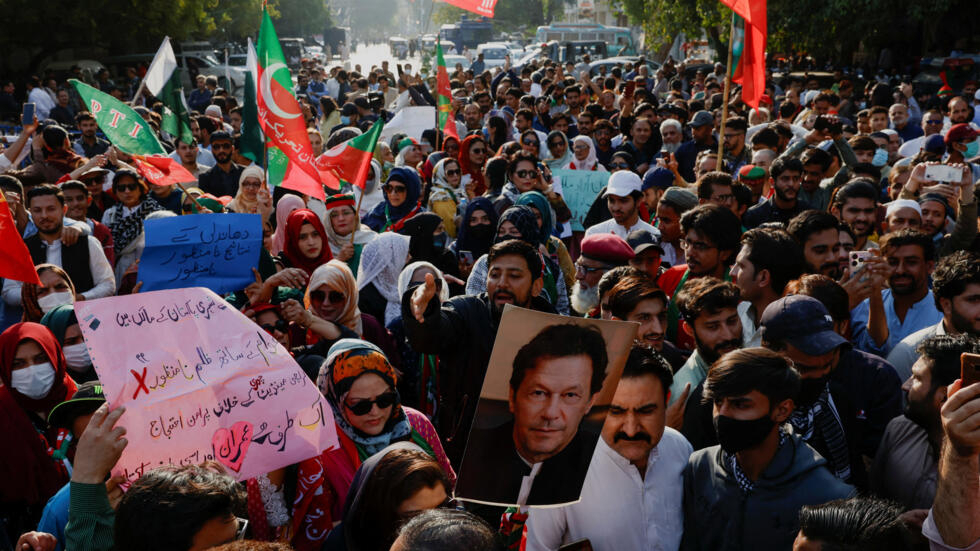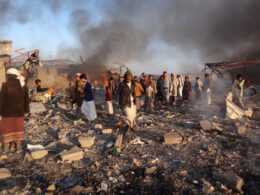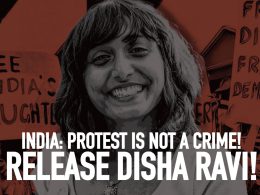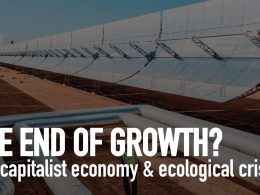By Geert Cool, LSP (our sister organisation in Belgium)
Despite all the undemocratic measures and fraud, Pakistan’s powerful army did not get the election result it wanted. A ban on former prime minister Imran Khan’s Pakistan Tehreek-e-Insaf (PTI) from standing under its own name and symbol, the switching off of mobile networks on election day, and a remarkably long time before the results were announced are just the most visible signs of electoral fraud.
Probably the vote count took so long because Pakistanis voted en masse against the candidates of army-backed parties. Independent candidates backed by the PTI won 96 of the 266 seats elected. Nawaz Sharif’s PML-N only got 75 seats and the PPP retains 54 seats. Besides this, there are 60 reserved seats for women and 10 for non-Muslims distributed among the registered parties with direct elected candidates. These good results for the PTI were widely described as a surprise.
The vote for Imran Khan’s candidates is less one of enthusiasm for the PTI than one of disapproval of the policies pursued by the political and economic establishment and more specifically by Pakistan’s army, which plays a major economic role and also sets the lines on the political terrain. In the absence of a political expression of the workers’ movement, Imran Khan can keep up his electoral position. There is the backdrop of galloping inflation — it reached 29.7% in December — coupled with a fall in the value of Pakistan’s currency and the threat of the country’s bankruptcy that was only delayed until March with a temporary IMF emergency package and Saudi credits negotiated by the army leadership.
The economic disaster was made worse by the 2022 floods, the effects of which are still reverberating in the textile sector, among others, which used to account for up to a third of the country’s industrial jobs. All this is making life unbearable for the Pakistani masses, inevitably leading to a growing distrust in the rulers responsible for this situation.
Under Prime Minister Imran Khan’s rule between 2018 and 2022, there was also no social progress and support for his PTI fell. Imran Khan spent years building his political career with a combination of populist rhetoric that capitalised on popular hopes for change coupled with building close ties with the army chiefs. Those ties went back as far as Musharraf’s military dictatorship between 1999 and 2007. In 2008, Imran Khan turned against Musharraf at a time when it became clear that the army favoured democratic rule. In 2018, the PTI won elections convincingly and Imran Khan was able to form a government with some smaller partners.
Imran Khan became overconfident when he interfered in the composition of the army leadership. This sealed his fate and it was the beginning of a massive campaign against Imran Khan and his party. He was prosecuted and jailed, with no prospect of a quick release. In the two weeks before the elections, there were no less than three convictions of Khan with 10 years, 14 years and seven years in prison respectively on charges of corruption, releasing state secrets, and alleging that Khan and his wife had failed to observe the religious rule of the Iddat (period after the death of her husband that a wife may not remarry) in 2018.
The PTI was not allowed to stand under its own name and logo, forcing elected members of the party to sit as independents. This affects their weight in parliament. One possible loophole is that the PTI elected members all join the small originally Shia party Majlis Wahdat-e-Muslimeen (MWM), which won a seat in the National Assembly in Khyber Pakhtunkhwa province through an alliance with the PTI. However, it remains to be seen how the army would respond.
The PML-N of Shehbaz Sharif and his brother and party leader Nawaz Sharif, meanwhile, is trying to quickly form a government. With 75 seats, the PML-N suffered another defeat and the party fell short of expectations despite the rigging. However, it is possible to form a majority with the PPP (54 seats) of the Bhutto family eager to form such a coalition. There may also be support from the smaller party MQM, which is particularly strong in the metropolis of Karachi and won 17 seats. Before the elections, the MQM already declared that it would support Sharif as prime ministerial candidate.
However, the hope of getting a mandate, or at least the semblance of a mandate, for this government with the elections has not been fulfilled. This undermines its stability and this in a context of great difficulties and problems. The threat of direct military rule is real, even if the vote of no confidence in the parties now forming a government was also directed against the military.
The Sharif government will continue current policies. There are attempts to gain popularity by attacking Afghan refugees as scapegoats. In October 2023, the government, officially a caretaker government, decided to expel millions of Afghans from the country. There are 3.8 million Afghans living in Pakistan, some for decades and often in poor conditions. The mass deportation plan is being put into action, with Afghans being put on trucks across the border even if there is no shelter there and many do not know where to go in Afghanistan. Perhaps around half a million Afghans have already been deported from the country. This mass deportation is an attack on human rights but remains largely under-reported in the international media.
In Pakistan, there is little opposition to it and the scapegoating policy seems to be catching on. However, it will not make the economic and social problems go away. There is no prospect of improvement. There is no economic growth, inflation is extremely high, unemployment continues to rise sharply (especially among the youth) and the geopolitical tightrope walk is not getting any easier.
There has been an increasing dependence on China in recent decades, military ties between China and Pakistan are also very strong. For China, Pakistan offers a passage to the sea and an important regional ally, even vis-à-vis its regional rival India. However, its infrastructure and economic projects are not flowing smoothly and also meet opposition and are heavily concentrated in Balochistan, with the Chinese-built port of Gwadar. On 16 January, Iran carried out a series of missile strikes on Pakistani territory, claiming it was targeting a Balochi group. This was followed on 18 January by Pakistani revenge attacks, allegedly on other Balochi nationalist groups. Even if a de-escalation was announced on 19 January, Balochistan remains a vessel of instability. Together with China’s own economic problems, this puts pressure on investment and smashes the illusion of a Chinese-driven economic revival.
At the same time, the Pakistani regime keeps the connection with US imperialism open. That link lost importance with the US military withdrawal from Afghanistan, but along the other side, US imperialism also does not want Pakistan to become a complete puppet of China. The IMF’s willingness to intervene with temporary credit to lift the debt crisis over the elections is an expression of this. Only, that debt crisis is so big that one temporary credit can only be a stepping stone to the next, with IMF credits accompanied by conditions that further undermine the purchasing power and living standards of the masses. With the current mountain of debt and the economic disaster in Pakistan, where only the army leadership and capitalists trusted by that leadership (including politicians like the Sharifs and the Bhuttos) see their wealth continuing to grow, there is no way out in sight.
The only social force that can provide an answer is the working class with the support of other oppressed groups. The labour movement is little organised and certainly has no political voice. This leaves room for other forces and for elements of division and support for reactionary tendencies. However, after years of reactionary rule, it is clear that no progress for the masses should be expected from this side. The working class must connect with its traditions of organisation and struggle. There are examples of struggles and strikes, usually on a limited scale but sometimes with a bigger impact like the protest against the high energy prices in 2023 or the recent women-led rallies and “Long March” held by the people of Balochistan protesting against the enforced disappearances, extra-judicial killings and other abuses by the Pakistani state. Strengthening these protests and linking them to popularising a programme of socialist social change is an urgent necessity.












